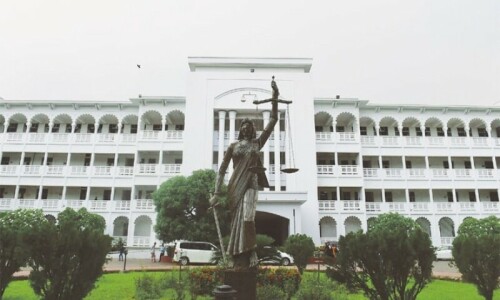NEW DELHI: Political turmoil in Bangladesh is likely to slow planned financial reforms and has already added to weakness in the banking sector, S&P Global Ratings said on Wednesday.
Prime Minister Sheikh Hasina quit and fled to India last week after student-led protests against her spiralled into some of the worst violence since Bangladesh’s 1971 independence from Pakistan, killing 300 people and injuring thousands.
An interim government, led by Nobel prize-winning economist Muhammad Yunus, has been appointed to plug a power vacuum and hold elections, but the protests have widened to target officials appointed during Hasina’s term, including the central bank chief and four deputy governors, who have resigned. A new central bank governor has been appointed.
“We see risk of policy inaction and a potential slowdown in financial reforms,” S&P Global Ratings credit analyst Shinoy Varghese said.
Weakness in the banking industry, including a lack of liquidity, thin capital buffers and ailing asset quality, has worsened while the departure of senior central bank officials could delay ongoing structural reforms, the rating agency said.
The anti-government protests emerged from a movement in July against quotas in government jobs, as the $450-billion economy — the world’s fastest-growing just years earlier — struggled with youth unemployment, inflation and shrinking reserves.
These conditions drove Hasina’s government to seek a $4.7bn bailout from the International Monetary Fund, which was approved in January 2023.
Weeks of unrest have fanned inflation, which reached 11.66 per cent in July — when the government imposed a nationwide curfew, shutting down transport, offices and the mainstay garments industry for days — from 9.72pc the previous month, according to official data.
Moody’s Analytics said last week it has provisionally revised Bangladesh’s GDP growth forecast for this year to 5.1pc from 5.4pc previously.
“Bangladesh’s recovery from the currency crisis hinges on the ability of any replacement government to meet public concerns and reestablish social order,” it said in a note.
The Asian Development Bank, a key development partner for Bangladesh, said it would work with the interim government towards macroeconomic and fiscal sustainability.
“A second priority is the expansion of private sector development to enhance competitiveness and create new employment opportunities,” the ADB said in a statement.
Published in Dawn, August 15th, 2024














































Dear visitor, the comments section is undergoing an overhaul and will return soon.